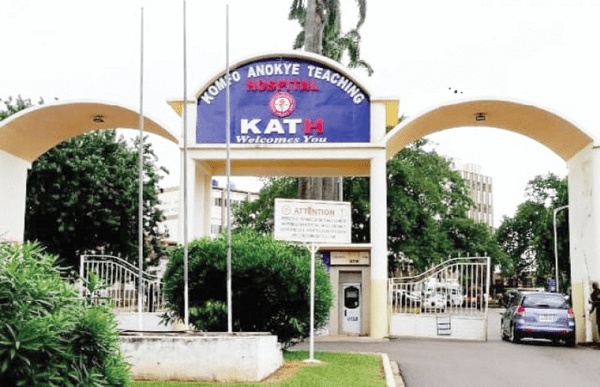The Head of Public Relations at the Komfo Anokye Teaching Hospital (KATH), Mr. Kwame Frimpong has indicated that the hospital is currently experiencing a ‘no space syndrome’. He stated that the KATH which was constructed to accommodate a relatively small number of patients is now catering for huge numbers than it can take due to lack of expansion for the facility.
He stated that, unlike the Greater Accra region where there are complementary facilities to the major hospitals like the Korlebu Teaching Hospital, the Komfo Anokye Hospital lacks any of these complementary facilities which has resulted in pressure being mounted on the hospital.
“All the cases are ending up here, so it is a very common site to see very congested halls. As I indicated the last time, if you go to the orange [hall], which was built for twelve, you will have about forty-two (42) beds with patients. All the beds are fully occupied”.
Mr. Kwame Frimpong
Mr. Frimpong further stated that the hospital needs urgent expansion and modernization as the pressure in the hospital is such that pieces of equipment used for work keep breaking down. He opined that due to the constant pressure, the beds, ventilators, and other equipment need to be replaced. “We are about the most accessible hospital in Ghana given our location, it is easier for other regions to access KATH than go to Accra” he added.
He disclosed that per the Ministry of Health’s record, the Ashanti region’s health sector is the least served concerning infrastructure. He stated that there are a few purpose-built hospitals in the region even though the region had been the most populous among all the regions for decades.
Moreover, Mr. Frimpong argued that the Ministry of Health’s neglect of the lack of space issues in KATH is not a result of unawareness but the disparity in development in the country. He maintained that hospitals in Accra that cater to fewer people than KATH , have much bigger spaces than KATH.
Dialysis Machines And Renal Treatments
He also indicated that the hospital requires dialysis machines for the treatment of kidney disease patients. He stated that the hospital needs the government’s assistance in procuring these machines as the KATH does not have the financial means to do so.
He revealed that the hospital signed a contract for the supply of three new dialysis machines in addition to six months of consumables for renal treatment which cost the hospital a sum of GH₵ 1.6 million. He stated that the hospital is unable to replace some pieces of equipment that have broken down because public hospitals have a suppressed tariff regime that causes loss to investments made by public hospitals.
“The tariff structure is such that, you may be able to recover only the cost of operation can be recovered and then maybe the cost of maintenance but not necessarily the cost of replacement which is very expensive. We are doing a comprehensive and innovative expansion of our dialysis center…by the end of the month we should be ready to start operating it”.
Mr. Kwame Frimpong
Mr. Frimpong disclosed that the expansion work done on the Dialysis Center has enabled the hospital to store about sixteen dialysis machines, two of which are already in the hospital. He indicated that Sprint Ford has donated two refurbished dialysis machines to the hospital and in total, the dialysis center has seven machines at the moment.
He specified that the state is responsible for procuring the machines that the hospital procured by itself. He argued that should public hospitals continue to procure for themselves the needed equipment that the government should, then the tariff structure needs to be reviewed to ensure hospitals do not incur losses on their investments.
Mr. Frimpong further opined that should the tariff structure remain the same, then KATH will be unable to provide for dialysis machines and the consumables that come with it because the hospital does not make enough from dialysis treatments.
Public hospitals have faced constant issues concerning structure or the unavailability of equipment or medication. Two notable ones are the ‘no bed’ syndrome at the Korlebu Teaching Hospital and the deplorable state of the now-demolished La General Hospital. While governments continue to boast of their achievements over the years, it is very sad the state of the country’s health sector.
READ ALSO: Culture and Religion, Limitations To Women’s Empowerment























